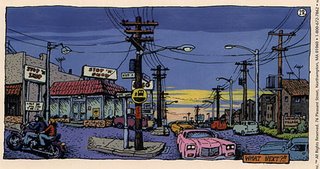 |
Xenophobia is a well-known term, from the Greek xenos meaning "foreign" and phobia meaning "fear" or "aversion." It is unfashionable and regarded as politically incorrect, and is one of the accusations hurled at, say, those who want to limit immigration.
The English philosopher and writer Roger Scruton has given a speech in which he provides a new definition for the opposite of "xenophobia"--oikophobia. Oikos means "house" or "household" in Greek, and hence is one of the roots of the word "economics"--the law of households.
"Oikophobia" is sometimes used, apparently, as the opposite of "agoraphobia," the latter being a fear of the agora or market, and thus crowds or open places. "Oikophobia" in this sense is fear of being at home.
Scruton means something quite different. It is systematic hostility to one's home, country, or tradition. It has long been common in this country, and in South America, among those, especially the élite and the wealthy, who used to look to Europe and especially to France, for all things classy and cultural.
Oikophobia has evolved, in the West, into a disdain, nay, hatred, of all things American in America, British in England, and so on. Consider the lefty singer Billy Bragg's Take Down the Union Jack:
Take down the Union JackIt's a constant search for cultural novelty and a rejection of the ways and traditions of one's own country.
It clashes with the sunset
And put it in the attic
With the Emperor’s old clothes
When did it fall apart ?
Sometime in the 80’s
When the good and the great
Gave way to the greedy and the mean
Scruton's whole speech on the subject is worth a read, but here's an excerpt:
When Sartre and Foucault draw their picture of the ‘bourgeois’ mentality, the mentality of the Other in his Otherness, they are describing the ordinary decent Frenchman, and expressing their contempt for his national culture. A chronic form of oikophobia has spread through the American universities, in the guise of political correctness, and loudly surfaced in the aftermath of September 11th, to pour scorn on the culture that allegedly provoked the attacks, and to side by implication with the terrorists. And oikophobia can be everywhere read in the attacks levelled against the Vlaams Belang [the Flemish independence party in Belgium].We find it in the jurisprudence of our Supreme Court, where Justices Ginsburg and Breyer have seen fit to use foreign law to interpret our own Constitution, and in the fetishization of that cartel of tyrants, the United Nations, seen not as a rather corrupt and inefficient forum with a few decent programs and a few practical uses, but as a kind of collective Messiah.
The domination of our national Parliaments and the EU machinery by oikophobes is partly responsible for the acceptance of subsidised immigration, and for the attacks on customs and institutions associated with traditional and native forms of life. The oikophobe repudiates national loyalties and defines his goals and ideals against the nation, promoting transnational institutions over national governments, accepting and endorsing laws that are imposed from on high by the EU or the UN, and defining his political vision in terms of cosmopolitan values that have been purified of all reference to the particular attachments of a real historical community. The oikophobe is, in his own eyes, a defender of enlightened universalism against local chauvinism.
The great poet Kenneth Rexroth, who was a kind of eco-anarchist, coined the term "Crow-Jimism." "Jim Crow," of course, was a name given to the system of legal racial segregation in the American South. "Crow-Jimisim" was the tendency, among the left and the literati, to worship uncritically everything thought to be Negro (the PC term, back then). Usually folks afflicted by this ailment had an unreal and romanticized notion of the Negro. This, too, is a kind of oikophobic pathology.
Oikophobia in part is the product of that ancient snobbism that looked to Paris and London for everything classy. It is in part a transformation of criticism of one or another policy of the government into a disdain for the whole society. And it is in part an expression of the big-city intellectual's sense of superiority to the rubes.
It's one reason for the contempt for George W. Bush as a person, that predates both 9/11 and the Iraq war. Bush seemed too American, too down home. Anyone like that must be an idiot, a Babbit, a zombie transfixed by the Elmer Gantrys of the world, part of the "booboisie," as Mencken put it. Better the cookie-pushing Adlai Stevenson than the flat-speaking Dwight Eisenhower. Better the incomprehensible self-indulgence of the nouvelle vague French and Italian cinéastes than Ford or Huston. Even the Dixie Chicks don't just disagree with the Iraq war, they're ashamed to be American.
Oikophobia is a disaster. If you want to change this country, and we all do, in one way or another, you can't despise it, but should learn to love it, to own it as part of oneself. Understand the national idea and the national tradition--there's much in it to love. If you want change, don't dream the dreams of Sartre and Foucault and Howard Pinter. Dream the "patriot's dream."
O beautiful for patriot dream
That sees beyond the years
Thine alabaster cities gleam
Undimmed by human tears!
America! America!
God shed his grace on thee
And crown thy good with brotherhood
From sea to shining sea!
And read "The Man Without a Country."
UPDATE: This piece on "transnationalism" makes a similar case in more detail. It's worth a read.

No comments:
Post a Comment